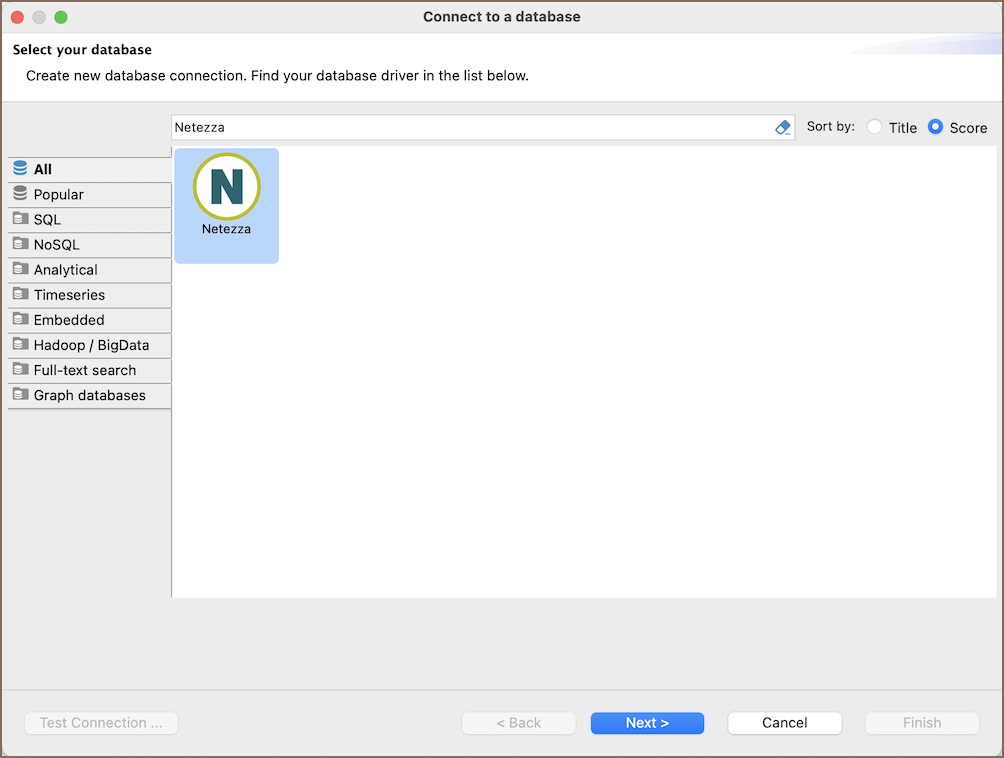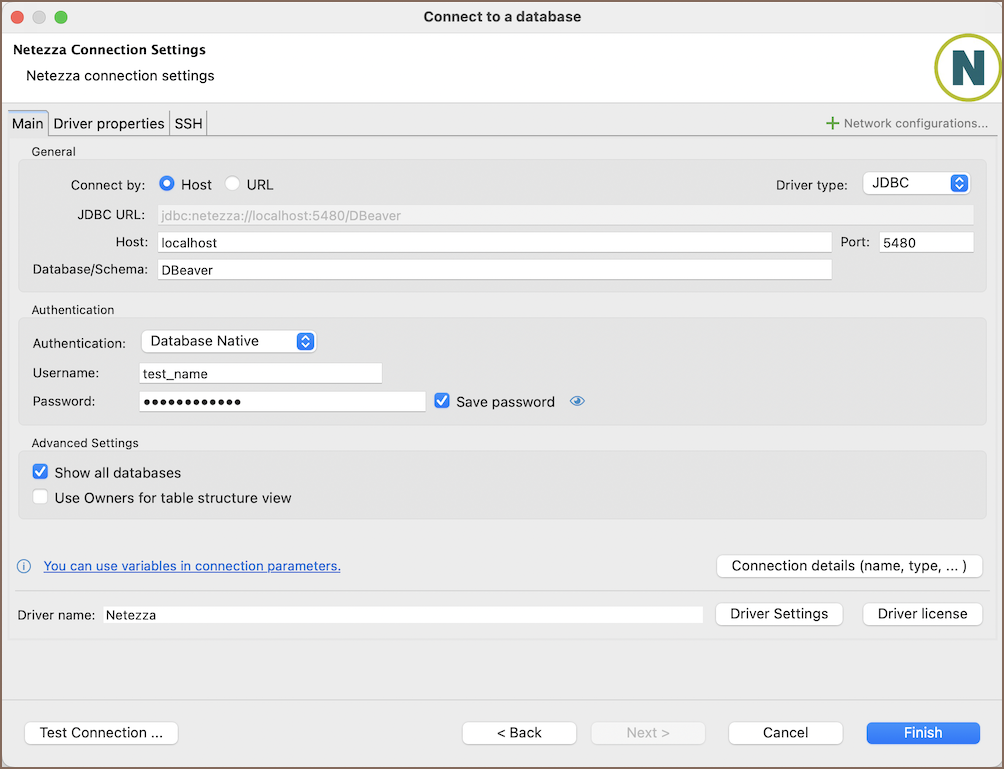Database driver Netezza
Table of contents
Overview
This guide provides instructions on how to set up and use Netezza with DBeaver.
Before you can start managing your database, it's essential to establish a connection in DBeaver. This involves
selecting the Netezza option to connect to the Netezza database. If you have not yet created a
connection in DBeaver, please refer to our Creating a Connection article for guidance.

Netezza specialty
Netezza is a high-performance data warehousing appliance that excels in delivering fast data analytics and warehousing solutions through its massively parallel processing (MPP) architecture. This system is tailored for complex analytics on large datasets, often scaling to petabytes of data. Netezza simplifies analytics by allowing operations directly on compressed data, significantly reducing the storage requirements and enhancing query performance.
The integrated architecture of Netezza, which combines database, server, and storage into a single, streamlined system, facilitates the easy management and scaling of data warehousing capabilities.
Setting Up
This section provides an overview of DBeaver's settings for establishing a direct connection and the configuration of secure connections using SSH, proxies, Kubernetes, SSL, and the setup of ODBC/JDBC drivers for Netezza.
Netezza connection settings
In this subsection, we will outline the settings for establishing a direct connection to a Netezza database using DBeaver. Correctly configuring your connection ensures seamless interaction between DBeaver and your Netezza database.
The page of the connection settings requires you to fill in specific fields to establish the initial connection.

| Field | Description |
|---|---|
| Connect by (Host/URL) | Choose whether you want to connect using a host or a URL. |
| Driver Type | Select the appropriate driver for your Netezza database. |
| URL | If you are connecting via URL, enter the URL of your Netezza database here. This field is hidden if you are connecting via the host. |
| Host | If you are connecting via host, enter the host address of your Netezza database here. |
| Database/Schema | Enter the name of the Netezza database/schema you want to connect to. |
| Port | Enter the port number for your Netezza database. The default Netezza port is 5480. |
| Authentication | Choose the type of authentication you want to use for the connection. For detailed guides on authentication types, please refer to the following articles: - Native Database Authentication - DBeaver Profile Authentication You can also read about security in DBeaver PRO. |
| Show all databases | Displays all databases in the Database Navigator. Note: This option works only when the Host connection type is selected. It does not work when connecting via URL. |
| Use Owners for table structure view | Show fully qualified table names in Database Navigator with owners names instead schemas. |
| Connection Details | Provide additional connection details if necessary. |
| Driver Name | This field will be auto-filled based on your selected driver type. |
| Driver Settings | If there are any specific driver settings, configure them here. |
Connection details
The Connection Details section in DBeaver allows for further customization of your Netezza connection. This includes options for adjusting the Navigator View, setting up Security measures, applying Filters, configuring Connection Initialization settings, and setting up Shell Commands. Each of these settings can significantly impact your database operations and workflow. For detailed guides on these settings, please refer to the following articles:
- Connection Details Configuration
- Database Navigator
- Security Settings Guide
- Filters Settings Guide
- Connection Initialization Settings Guide
Netezza driver properties
The settings for Netezza Driver properties enable you to adjust the performance of the Netezza JDBC and ODBC driver. These adjustments can influence the efficiency, compatibility, and features of your Netezza database.
For a complete walkthrough on setting up Netezza JDBC and ODBC drivers properties, you can refer to the official Netezza JDBC documentation. These guides detail each driver's properties and how they can be used to optimize Netezza database connections.
You can customize the Netezza driver in DBeaver via the Edit Driver page, accessible by clicking on the Driver Settings button on the first page of the driver settings. This page offers a range of settings that can influence your Netezza database connections. For a comprehensive guide on these settings, please refer to our Database drivers article.
ODBC and JDBC driver configuration
DBeaver provides extensive capabilities for managing Netezza database connections via ODBC/JDBC drivers. This functionality enables you to connect to your Netezza database using native ODBC drivers, offering an alternative when specific DBeaver drivers are not available.
You can find a comprehensive, step-by-step guide on how to install the driver manager, set up drivers, configure data sources, and establish connections in DBeaver in our ODBC Driver Configuration article.
Secure Connection Configurations
DBeaver supports secure connections to your Netezza database. Guidance on configuring such connections, specifically SSH, Proxy, Kubernetes and AWS SSM connections, can be found in various referenced articles. For a comprehensive understanding, please refer to these articles:
Powering Netezza with DBeaver
DBeaver provides a host of features designed for Netezza databases. This includes the ability to view schemas, along with numerous unique capabilities aimed at optimizing database operations.
Netezza database objects
DBeaver lets you view and manipulate a wide range of Netezza database objects. DBeaver has extensive support for various Netezza metadata types, allowing you to interact with a wide variety of database objects, such as:
- Databases
- Schemas
- Tables
- Unique Keys
- Primary Keys
- Foreign Keys
- Views
- Procedures
- Sequences

- Synonyms

- Tables
- Schemas
- Users

Data types
Netezza features in DBeaver
DBeaver is not limited to typical SQL tasks. It also includes numerous additional features compatible with Netezza, but not exclusive to it:
| Category | Feature |
|---|---|
| Data Transfer | Data Import |
| Data Export | |
| Session Management | Session Manager |
| Schema Management | Schema Compare |
| Data Visualization | ERD Guide |
| Query Execution plan | |
| Data Generation | Mock Data Generation |
